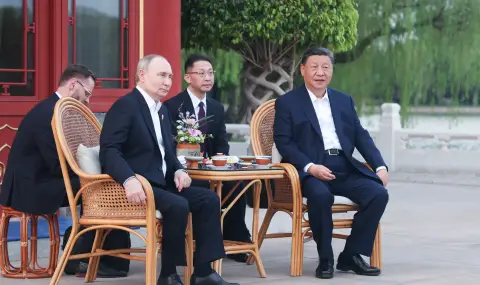"Everywhere I go, I face accusations of double standards,” said the supreme EU foreign affairs representative Josep Borrell at Oxford University in May. French President Emmanuel Macron told the Munich Security Conference last year: “I am shocked by the extent to which we have lost the confidence of the Global South”. And German Foreign Minister Analena Berbock had to endure criticism from her Chinese counterpart at the time, Qing Gan, who rebuffed her when she raised the issue of human rights in China.
Countries of the Global South have long accused the West of maintaining its rules-based order only when it suits it. Recently, however, they have become more frequent, especially after the start of the war in Ukraine and the war between Israel and Hamas.
India: Europe's problems are not the world's problems
Western leaders have declared Russian aggression against Ukraine a battle for the world political order: US President Joe Biden said a Russian victory “could mean the end of the rules-based international order”, and the defense of Ukraine is protection of the principles of this order.
The West's attempts to convince the democratic countries of the Global South, which are actually close to it, to side with it in the sanctions against Russia, however, often fail. This was the case for India, Brazil and South Africa. They all continue to trade with Russia, in some cases more than before the war, even if they don't want this to be seen as an endorsement of Russia's invasion of Ukraine.
India's Foreign Minister Subrahmanyam Jaishankar said on the occasion of the war in Ukraine that Europeans apparently believe that “the problems of Europe are the problems of the whole world, but the problems of the world are not the problems of Europe”. And Indonesian Defense Minister Prabowo Subianto Jojadikusumo said that when it comes to promoting peace, Western governments apparently have “one set of principles for Ukraine and another for the Palestinians”.
Rules for all or “diversity of civilizations“?
In a world of growing geopolitical rivalry, the Western model is increasingly suffering from a loss of credibility, writes Sophie Eisentraut, head of research at the Munich Security Conference. China, for example, offers an alternative. Instead of globally applicable rules, China talks about “absolute sovereignty”, i.e. non-interference in internal affairs and respect for the “diversity of civilizations”.
China, like Russia, is promoting this alternative globally. In the summer of last year, about a year and a half after the start of the full-scale war in Ukraine, at a high-level meeting with African governments, President Vladimir Putin declared: “A true multipolar world order is emerging, and the era in which one country or group of countries ruled, ends.“ With this statement, he managed to open the door to many African governments.
It is widely believed that the existing order of international rules and institutions, which is characteristic of the West, primarily benefits the West itself and that Western countries are not living up to their own standards. This is also proven by a survey of the Munich Security Conference conducted in nine countries of the Global South. At the same time, the survey also shows that many people in this part of the world believe in the value of existing international rules.
Criticism is often justified
Sophie Eisentraut makes it clear: criticism of the West's double standards is often justified. For example, the countries of the Global South point out that the US and other Western countries insisted on the principle of territorial integrity of Ukraine, but did not respect this principle during the US-led invasion of Iraq in 2003. Western countries ignored human rights in illegal arrests in the fight against terrorism. And the Europeans made a deal with the North African autocrats to prevent migration to Europe.
Eisentraut, however, points out that critics from countries like China and Russia often use their accusations to relativize their own violations of the international order. Or they use them to justify a foreign policy approach that no longer follows any moral principles and only cares about their own interests. As a result, the value of universal rules is being questioned around the world.
A world without rules?
According to Eisentraut, Western countries face a dilemma: they fear that if they deal with their own inconsistency in a self-critical way, it will benefit their global rivals. On the other hand, if they ignore criticism, they will rightly be seen as cocky.
Western countries, of course, should minimize such contradictions between their statements and actions, the expert believes. Second, they need to talk more honestly about where “consistency has its limits”. This also includes no longer dividing the world into black and white countries that follow the rules and those that break them, because the subject has many nuances. Communication also includes pointing out the fact that autocratic systems do not admit open debate about their own contradictions and thus possible correction.
Finally, Eisentraut believes that the West must confront what criticisms of Western double standards often imply without saying it overtly: namely, that an “order characterized by double standards is not better than order without any standards”. Not only the countries of the West, but also many of the countries of the Global South stand to lose in a world without commonly accepted rules.
Author: Christoph Hasselbach
